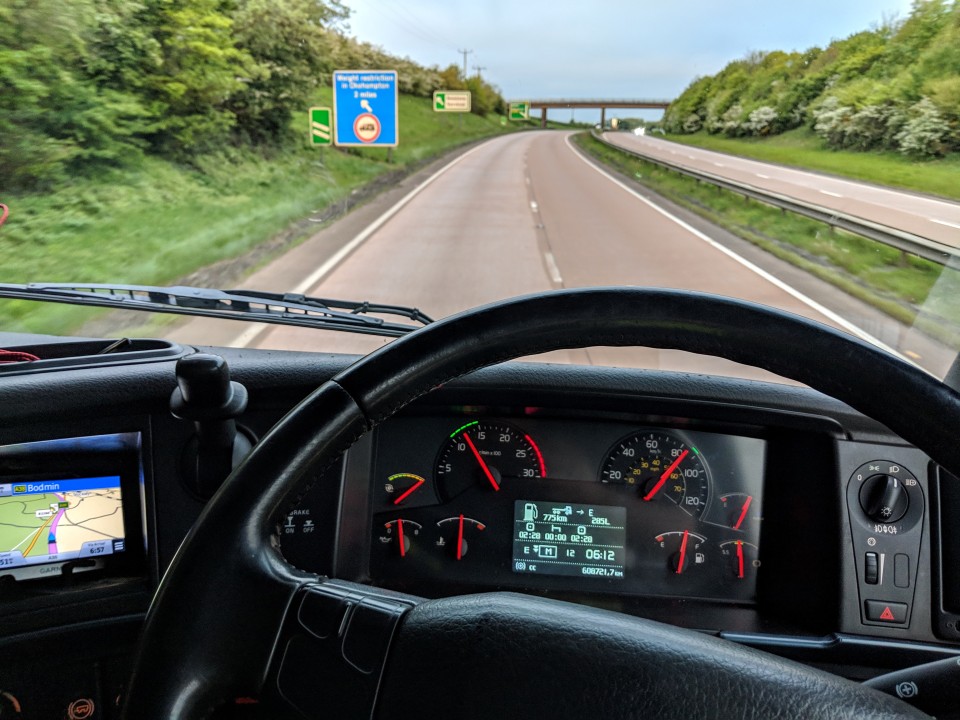
Susie Jones
Hoe word ik een gezonde vrachtwagenchauffeur
Gemaakt: 27-08-2024
•
Bijgewerkt: 27-08-2024
Als veeleisend beroep brengt vrachtwagenchauffeurs vaak lange uren, een zittende levensstijl en langere perioden weg van huis met zich mee, wat vaak zijn tol eist van de gezondheid van veel chauffeurs.
Ongezonde gewoonten zoals de consumptie van fastfood, een gebrek aan lichaamsbeweging en een verstoord slaappatroon kunnen allemaal leiden tot mogelijke gezondheidscomplicaties in de toekomst. Maar hoe blijf je fit als vrachtwagenchauffeur? Het is makkelijker gezegd dan gedaan, maar we hebben een lijst met tips samengesteld om je onderweg op je best te houden.
Zes tips om gezond te blijven onderweg
1.Hydratatie
Een eenvoudige tip en een goed dat we vaak als vanzelfsprekend beschouwen, maar de meeste gezondheidsproblemen ontstaan door uitdroging. Regelmatige slokjes water of squash gedurende de dag verdrijven metabolische afvalstoffen en gifstoffen uit je systeem en houden je energieker en alerter. Een hervulbare waterfles bij je houden herinnert je er niet alleen aan om gehydrateerd te blijven, maar is ook beter voor het milieu.
2.Dieet
De verleiding van fastfood na een lange dag is iets waar we allemaal mee te maken kunnen krijgen, maar net als het op peil houden van je vochthuishouding speelt ook je voeding een belangrijke rol in je gezondheid en hoe je je de hele dag zult voelen.
Het wordt aanbevolen dat vrachtwagenchauffeurs drie tot vier keer per dag eten, ofwel twee maaltijden en twee snacks of twee maaltijden en één snack. Probeer een maaltijd- en snackplan aan te houden met veel omega-3, ijzer en vitamine C, zoals groene bladgroenten, vis en fruit. Vermijd veelvuldig eten en drinken zoals pasta, brood, zoete dranken en stimulerende middelen zoals koffie en energiedrankjes.
Bekijk onze lijst met gezonde snacks die je in je cabine kunt bewaren:
Mueslirepen
Energierepen
Popcorn
Noten
Gedroogd fruit
Zwarte chocolade
Naast het kopen van gezond voedsel onderweg, kan het soms gezonder en kosteneffectiever zijn om een maaltijd voor te bereiden. Frieghtech heeft een fantastische selectie recepten om je te helpen een gezond dieet te behouden terwijl je aan het werk bent.
3.Slapen
Door de aard van het werk kan het moeilijk zijn voor een vrachtwagenchauffeur om voldoende slaap te krijgen, wat kan leiden tot verwoestende gevolgen voor iedereen op de weg.
Eenvoudige tips en trucs zoals de volgende kunnen je helpen om een goede nachtrust te hebben:
Creëer een omgeving in de cabine die aanvoelt als thuis. Bekijk ons bericht over hoe je van je vrachtwagencabine een thuis maakt
Houd je slaapruimte donker
Een warme douche: Gebruik onze maps pagina om uit te vinden welke truckstops deze faciliteit bieden.
Probeer een aantal Apps om je te helpen slapen
Vind de ideale plek om te parkeren met weinig lawaai en verstoring. Onze intruck app biedt 5.000 locaties voor vrachtwagens (Heavy Goods Vehicle) in heel Europa waaruit je kunt kiezen, terwijl ons SNAP Access and Security team beveiligingsoplossingen op maat kan bieden, zodat je beter kunt slapen in de wetenschap dat jij en je vrachtwagen veilig zijn.
4.Oefenen
Een van de moeilijkste tips om onderweg te volgen, maar niettemin een belangrijke. Lange uren zitten gedurende de dag kan leiden tot een slechte houding, rugpijn en mogelijke complicaties voor de gezondheid. Na een lange dag achter het stuur kan het verleidelijk zijn om te gaan zitten en te ontspannen, maar een snelle activiteit van 15 minuten, zoals wandelen of stretchen, kan ervoor zorgen dat je je verjongd en minder gestrest voelt.
HMD Trucking heeft een aantal nuttige oefeningen op maat voor vrachtwagenchauffeurs als je verschillende soorten lichaamsbeweging in je routine wilt opnemen.
5.Vitaminen
Als je fulltime onderweg bent, kan het moeilijk zijn om al je noodzakelijke vitaminen binnen te krijgen. Elke dag een multivitamine nemen kan je immuunsysteem stimuleren en je helpen gezond te blijven.
6. Geestelijke gezondheid
We weten dat het belangrijk is om onderweg voor je fysieke gezondheid te zorgen, maar hoeveel tijd nemen vrachtwagenchauffeurs om voor hun mentale gezondheid te zorgen?

De liefdadigheidsinstelling voor geestelijke gezondheid Mind heeft statistieken gepubliceerd waaruit blijkt dat 30% van de zelfgerapporteerde werkgerelateerde aandoeningen in de transport- en logistieke sector te wijten zijn aan angst, eenzaamheid, stress en depressie. Ze gaven ook aan dat dit aantal hoger zou kunnen liggen omdat de meeste mensen niet de hulp zoeken die ze nodig hebben. Daarnaast geeft 95% van de mensen die ziek zijn niet de echte reden voor hun afwezigheid op het werk als het gaat om hun geestelijke gezondheid.
Het opvolgen van de bovenstaande tips en trucs kan een positief effect hebben op je mentale gezondheid. Verder is het belangrijk om open en eerlijke gesprekken te voeren met andere vrachtwagenchauffeurs, supervisors of dispatchers.
Kan lichaamsbeweging je een betere chauffeur maken?
Een gezonde levensstijl leidt niet alleen tot een betere mentale gezondheid, maar er zijn ook aanwijzingen dat je er een betere chauffeur van wordt. Een onderzoek toonde aan dat bestuurders die gevraagd werden om dagelijks te bewegen, meldden dat ze gemakkelijker hun hoofd konden draaien, hun lichaam verder konden draaien en sneller in hun auto konden stappen.
Wat is het moeilijkste aan vrachtwagenchauffeur zijn?
Lange uren lijken een van de moeilijkste aspecten van vrachtwagenchauffeur te zijn. Truckers moeten vaak lange kilometers afleggen en asociale uren maken. Deze lange kilometers en asociale uren kunnen leiden tot een ongezonde levensstijl.

Hoe ongezond is het om vrachtwagenchauffeur te zijn?
Door de levensstijl van veel vrachtwagenchauffeurs hebben ze statistisch gezien gemiddeld meer kans op gezondheidsproblemen dan mensen in andere carrières. Vrachtwagenchauffeurs worden vaak geconfronteerd met een aantal obstakels zoals krappe werkruimtes, stressvolle situaties, ongebruikelijke slaappatronen en een gebrek aan voedingsstoffen die allemaal invloed hebben op hun gezondheid.
Een gezonde levensstijl aanhouden als vrachtwagenchauffeur vergt een bewuste inspanning, maar de voordelen zijn de moeite waard. Met de bovenstaande tips kun je je gezondheid in eigen hand nemen en je welzijn verbeteren. Houd een oogje in het zeil voor meer tips en trucs van ons bij SNAP.



